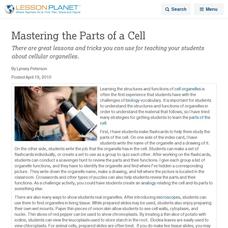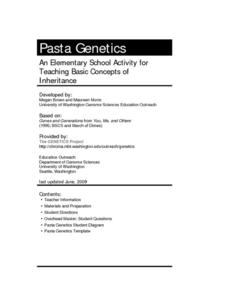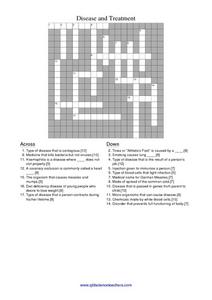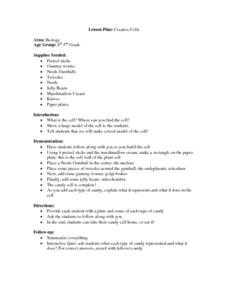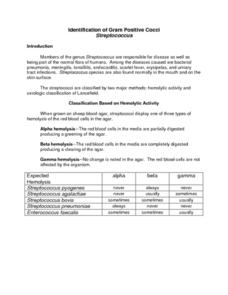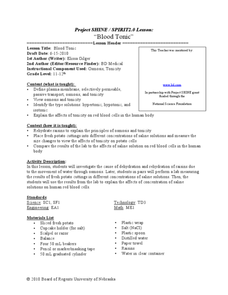Curated OER
Producing a Strain of E. coli that Glows in the Dark
Students observe the experimental process called bacterial transformation and demonstrate phenotype changes in bacteria that have been transformed with an antibiotic-resistance gene and a metabolic marker. They create a luminescent...
Curated OER
Mastering the Parts of a Cell
There are great lessons and tricks you can use for teaching your students about cellular organelles.
University of Washington
Pasta Genetics
Four different-shaped and dyed pasta types represent four different alleles. Following a guide sheet, young geneticists practice randomly selecting alleles and discover the traits of the resulting offspring. This is a fun and solid...
Cornell University
Shedding a "Little" Light on Cancer Surgery
Many types of cancer treatments now depend on nanotechnology—a big "little" discovery. Scholars begin by removing "malignant" tissue from simulated brains, one using fluorescent markers thanks to nanotechnology and one without. This...
Curated OER
Viruses and Bacteria
A series of questions about archaebacteria and eubacteria reinforce a chapter on viruses and bacteria. This worksheet is from chapter 18 of an unspecified textbook, but could work with your biology lecture as well. High schoolers...
Curated OER
Disease And Treatment
In this Disease and treatment worksheet, students solve 17 clues in a crossword puzzle about types of diseases, types of micro-organisms and immune system cells.
Curated OER
Electron Transport System Made Fun and Easy:
Students identity the components of electron transport system through role play. They explain the role of intermediate energy carriers to the production of ATP molecules. They describe the relationship of electron transport system to...
Curated OER
What Should I know for the Test?
A three-page quiz about genetics, which includes Punnett squares, blood types, questions about Mendel and his contributions, and vocabulary comprehension. Use this for a study guide, a pretest/post-test, or a note-taking worksheet in...
Nuffield Foundation
A Closer Look at Blood
Here is a lab that has teenage scientists examining samples of their own blood under a microscope. Learners carefully prepare slides, then make detailed observations and identifying different types of cells using a key.
Curated OER
Biology: Creative Cells
Students use various snacks to make large models of human cells. Items such as gumballs, gummy worms, and jelly beans represent the nucleus, golgi bodies, and mitochondria. As each piece of candy is added, the teacher explains what it...
Curated OER
The Nervous System
Human biology beginners label colorful diagrams of the neuron, the reflex pathway, and the brain. They list steps in the action potential process, and describe several different neurotransmitters. This worksheet guides learners through...
Howard Hughes Medical Institute
Winogradsky Columns: Microbial Ecology in the Classroom
Winogradsky columns are ideal for observing the role of bacteria and other microorganisms in an ecosystem. This student activity guide is complete with data tables for observations and analysis questions for processing what was observed....
Curated OER
Identification of Positive Streptococci
After being introduced to the genus Straptococcus, biology buffs set up agar plates, esculin slants, and salt broth tubes with different species to test. The level of laboratory skills required to perform this activity makes it most...
Virginia Department of Education
Genetic Variation and Mutations
Young scientists demonstrate their creativity while completing several activities, to assess genetic variations and mutations. Instructors provide a list of options and scientists choose to write a comic strip, create a book, construct a...
Serendip
Mitosis and Meiosis Card Sort
Cells divide by one of two processes, either mitosis or meiosis. Scholars sort cards into two sets, one representing each type of cell division. Then, they sequence the cards demonstrating an understanding of the movement of chromosomes.
Nuffield Foundation
Following Gene Transfer by Conjugation in Bacteria
After the lab, you'll be able to solve this analogy: Natural selection is to vertical transfer of genes as ___ is to the horizontal transfer of genes. Young biologists conduct an experiment on E. coli bacteria to explore the process of...
Serendip
DNA Structure, Function and Replication
Before a cell replicates, its DNA must replicate. Take advantage of a hands-on guided lesson to teach budding scientists how this happens. Using a set of nucleotide cards, learners become the DNA and work to create matching strands...
Curated OER
Dinosaur and DNA Days
Biology stars extract DNA samples from beef thymus and then examine its properties. They use enzymes to digest the DNA samples, and then use electrophoresis to separate fragments. Finally, they discuss methods and principles of...
Science Friday
Microorganisms on the Move
You can't b. cereus until you see this lesson! Young microbiologists learn to prepare deep well slides, observe two types of microorganisms, and compare and contrast their physical characteristics in this interactive and lively activity.
Curated OER
Solving Crosses
Genetics hopefuls solve Punnett Squares for monohybrid and dihybrid crosses. An example of each is provided to teach the process. Other heredity patterns are mentioned and genetic disorders are listed in the second half of the...
Curated OER
Who Wants to be a Cellular Biologist?
Eighth graders review concepts in cellular biology. In this biology lesson, 8th graders play an interactive game based on the idea of winning money. They discuss misconceptions about the topic.
Curated OER
Fungi Crossword
In this biology worksheet, students complete a crossword puzzle with 28 questions about fungi. They identify the different parts of a fungus.
Curated OER
Blood Tonic
Learners investigate the process of osmosis using fresh potato cuttings in saline solution. For this biology lesson, students explain the difference between hypertonic, hypotonic, and isotonic solutions. They collect data from the...
Curated OER
Energy Extravaganza
Tenth graders study how cells and organisms acquire and release energy through photosynthesis and cellular respiration. They explain that living organisms use matter and energy to synthesize a variety of organic molecules and they will...



